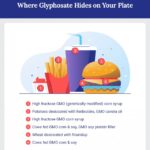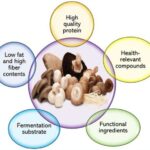Caffeine, a popular stimulant, is often associated with coffee and tea. But did you know that many other foods and drinks also contain caffeine, sometimes unexpectedly? If you’re looking to boost your mood, energy, and focus with natural sources of caffeine, it’s essential to know where to find them. This guide will explore various natural foods and beverages that contain caffeine, helping you make informed choices and avoid unwanted side effects.
Understanding Caffeine and Its Effects
Caffeine is a stimulant that affects the central nervous system, naturally found in various plants, leaves, and seeds. Common sources include coffee beans, cocoa beans, and tea leaves. Guarana, a Brazilian plant, and kola nuts from West Africa are also notable sources.
While caffeine offers benefits such as improved mood, focus, memory, and concentration, excessive intake can lead to adverse effects. These include anxiety, dehydration, digestive issues, headaches, increased heart rate and blood pressure, and sleep disturbances.
Individual reactions to caffeine vary. Health experts recommend limiting caffeine intake to 300 to 400 milligrams per day. This is equivalent to approximately two to three eight-ounce cups of coffee. Teas generally contain less caffeine, with black tea containing 50 to 80 milligrams per cup and green tea containing 20 to 30 milligrams.
Some individuals, such as children, teens, and those with specific health conditions, may need to limit or avoid caffeine altogether.
Unexpected Sources of Natural Caffeine
Identifying natural food with caffeine can be tricky, as many sources are not immediately obvious. Here are some surprising foods and drinks that contain caffeine:
1. Chocolate
Any food flavored with cocoa contains caffeine. This includes baked goods, beverages, and ice cream. The amount of caffeine varies depending on the specific product and the concentration of cocoa. Dark chocolate generally has more caffeine than milk chocolate.
2. Decaffeinated Coffee and Tea
Despite being labeled “decaffeinated,” these products still contain small amounts of caffeine. Regulations require manufacturers to remove only 97% of the caffeine. A cup of decaf coffee can contain 2 to 15 milligrams of caffeine.
3. Kombucha
This fermented tea, popular for its probiotic benefits, also contains caffeine. While beneficial for gut health, the caffeine content can be problematic for individuals sensitive to stimulants or those with gastrointestinal conditions.
4. Matcha and Yerba Mate
These herbal teas are potent sources of caffeine. A cup of matcha tea contains approximately 49 milligrams of caffeine, while a teaspoon of matcha powder has about 88 milligrams. Yerba mate tea can contain up to 80 milligrams per cup. These teas are also found in various processed foods, such as ice cream and baked goods.
5. Snack Bars
Many snack bars marketed as energy boosters contain caffeine derived from chocolate, coffee beans, extracts, guarana, matcha, or yerba mate tea. Always check the ingredient list if you’re trying to monitor your caffeine intake.
6. Non-Cola Sodas and Bottled Water
Kola nuts, traditionally used in cola-flavored sodas, are sometimes used in other soda flavors like orange or lemon-lime. Non-cola sodas can contain significant amounts of caffeine. Additionally, bottled waters marketed as energy drinks often have added caffeine.
7. Supplements
Over-the-counter supplements, including pre-workout formulas, weight-loss aids, and energy boosters, can contain caffeine. The caffeine content can vary widely as supplements are not strictly regulated. Consulting with a healthcare professional before taking supplements is highly recommended.
Identifying Caffeine on Food Labels
The FDA doesn’t mandate that manufacturers list caffeine content on food and beverage labels, making it challenging to track intake. However, you can look for specific ingredients like cocoa, coffee, or mocha flavoring. Ingredients such as matcha, yerba mate, guarana, and kola nuts also indicate the presence of caffeine.
Checking online menus for restaurants can also provide information about ingredients in specific dishes.
Finding Natural Foods With Caffeine
When searching for natural foods with caffeine, consider these options:
- Coffee: Opt for organic, fair-trade coffee beans for a sustainable and ethically sourced caffeine boost.
- Tea: Choose from a variety of teas, such as green tea, black tea, and white tea, each offering different caffeine levels and health benefits.
- Cocoa: Select high-quality cocoa powder or dark chocolate with a high percentage of cacao for a flavorful and naturally caffeinated treat.
- Guarana: Explore energy drinks or supplements that contain guarana, a natural source of caffeine known for its sustained release.
Listening to Your Body
Monitoring caffeine intake is crucial. Pay attention to how your body reacts and adjust your consumption accordingly. If you experience anxiety or other adverse effects, consider reducing your caffeine intake or finding alternatives. If you find yourself unable to function without caffeine, it may indicate an underlying health issue, such as a sleep disorder. Consulting with a healthcare professional can help determine a safe and appropriate caffeine intake level for your individual needs.
Conclusion
Finding natural food with caffeine can enhance your energy levels and focus, but it’s important to be aware of the hidden sources in various foods and beverages. By understanding these sources and listening to your body, you can make informed choices to enjoy the benefits of caffeine while minimizing potential side effects. Always check labels, be mindful of serving sizes, and consult with healthcare professionals when needed to maintain a balanced and healthy lifestyle.

